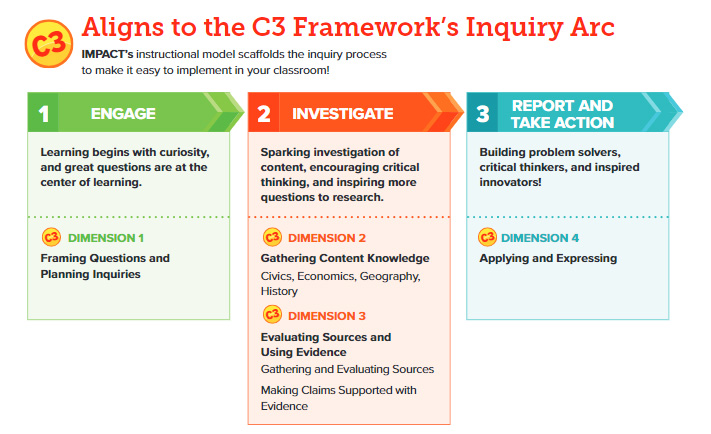
An Elementary Social Studies Curriculum
IMPACT Social Studies: An Overview
Today’s Students are Tomorrow’s Leaders
It’s important to create and cultivate an environment where students grow in their capacity to understand the world around them.
With IMPACT Social Studies for grades K–5, students will gain building blocks for critical thinking, develop a strong reading and writing foundation, and learn what it means to be responsible, active citizens. With engaging content, geared to today’s elementary school students, IMPACT takes a fresh approach to social studies curriculum in the elementary classroom.
Learn more about the Guiding Principles for IMPACT Social Studies.
Inquiry
IMPACT Social Studies teaches the art and strategy of inquiry as teachers model how to ask questions and do research. Students learn how to analyze sources and consider multiple perspectives as they think critically about problems, events, places, and people. Each chapter inquiry project is designed to engage elementary school students by encouraging them to ask questions and look for answers, while providing opportunities for students to work together collaboratively.
View Sample Projects: Grade K, Grade 1, Grade 2, Grade 3, Grade 4, Grade 5
Literacy
Reading about people and events that shape our world is relevant. Literacy skills provide the foundation for inquiry. Students apply literacy tools—strategies for close reading, writing, and speaking and listening—to comprehend, critique, and synthesize social studies content.

Citizenship
A primary goal of IMPACT Social Studies is to prepare young learners to become active citizens—both locally and globally—in an ever-changing world. Throughout this elementary social studies curriculum, students are given opportunities to learn about and apply good citizenship practices. The texts and activities focus on developing civic values and democratic principles as students build an understanding of their role in the community, the nation, and the world.

Flexible
There are days when you have very limited time for social studies. Then, there may be days when you have time for longer lessons. With IMPACT’s unique and innovative resources, you can decide the length of time to teach, if you want to use print and/or digital, and which resources best fit your classroom needs and priorities.
View our brochure on the flexible pathways for IMPACT Social Studies.

Components for IMPACT Social Studies
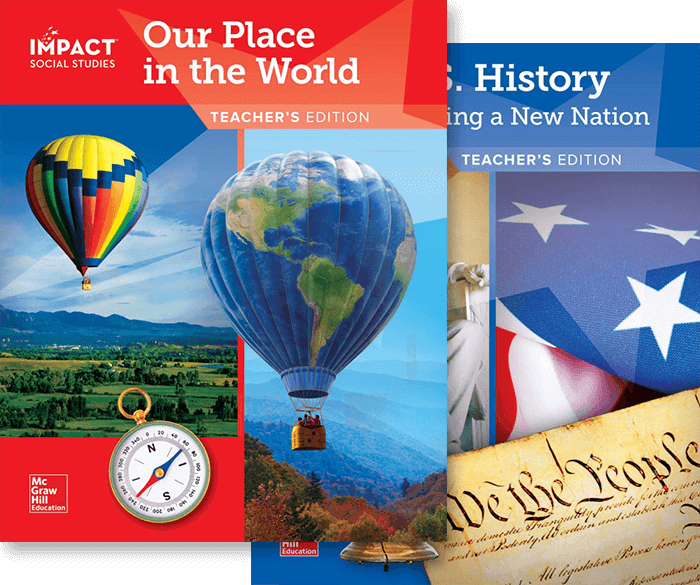
Teacher’s Edition
The Teacher’s Edition offers the flexibility to organize and expand chapter content based on student inquiry. Social and emotional learning (SEL) call-outs offer point-of-use tips, while embedded language learners support—with research-based instruction and strategies—help all students make connections to the text. The scaffolded curriculum, instructional support, and assessment techniques make planning your IMPACT™ easy.
Available in both print and digital formats.
Explorer Magazine Teaching Guide
The Explorer Magazine Teaching Guide offers leveled texts in a new, engaging manner. Easy-to-use lesson plans empower teachers to assign articles by reading level, allowing students to extend chapter content.
Available in both print and digital formats.
Spanish Components
All components are available in Spanish as part of the IMPACTO curriculum.
Please contact your sales representative for more information.
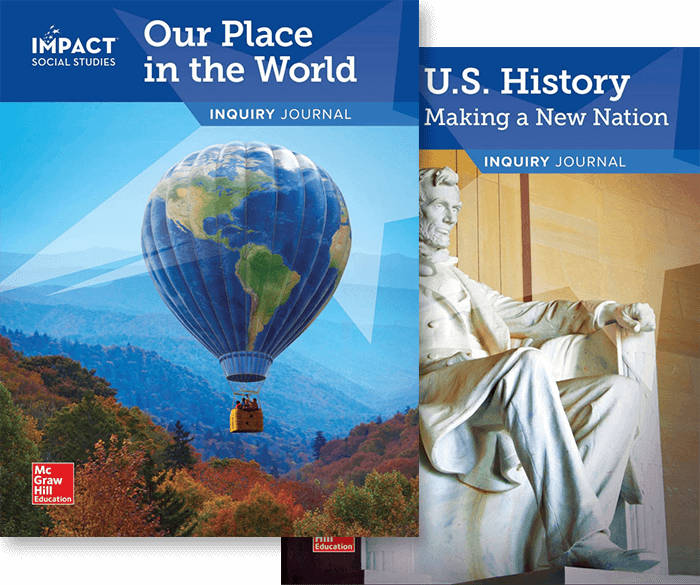
Inquiry Journal
The Inquiry Journal begins the student inquiry experience with Essential Questions. Students analyze images, use close reading strategies to evaluate sources, and write opinions citing evidence from their investigations.
Available in both print and digital formats.
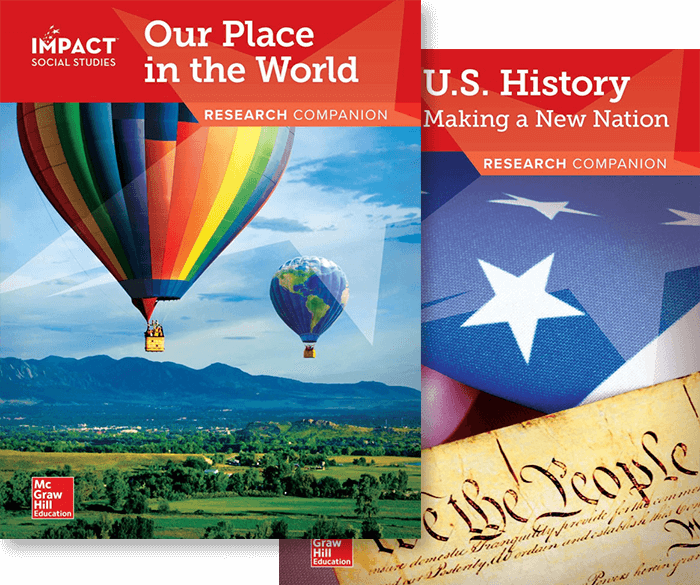
Research Companion
The Research Companion is where students deepen their knowledge and understanding of chapter content, guided by Essential Questions. This tool allows students to learn the art of research and critical analysis of history, geography, economics, and citizenship.
Available in both print and digital formats.
Explorer Magazine
The Explorer Magazine is designed to help students dig deeper into chapter content. Within each chapter of the magazine, articles in a variety of formats explore ideas related to the Essential Question. These articles provide a unique perspective for students to use in their research and investigations.
Available in both print and digital formats.
Spanish Components

All components are available in Spanish as part of the IMPACTO curriculum.
For more information, contact a sales rep.
Kindergarten



Children learn about the foundational concepts of identity, diversity, cooperation, and citizenship. Themes are woven into a discovery of significant places, and historical events. Children will also be introduced to using primary sources, maps, and timelines to learn about the world around them.
Chapters
- How Do People Learn and Work Together?
- Where Do We Live?
- What Does It Mean to Be an American?
- How Has Our World Changed?
- Why Do People Have Jobs?
Grade 1
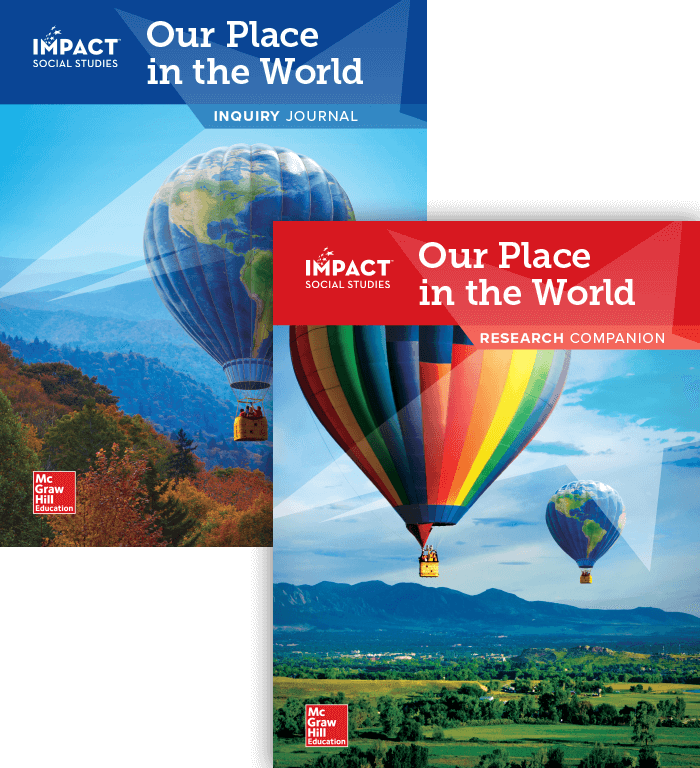



Students learn about the United States and the people that make it great. They understand how to learn about history, move into geography and where we live. Discovery continues with the people who make our country, from the founders to the many cultures that shaped our nation. Finally, students learn about the economics of work and trade.
Chapters
- What Are the Rights and Responsibilities of Citizens?
- How Can We Describe Where We Live?
- How Do We Celebrate Our Country?
- How Does the Past Shape Our Lives?
- Why Do People Work?
Grade 2



Students are given the tools to investigate where they live, including its history, geography economy, and government. They learn about people who have made an impact on the world and explore ways that they can impact their own world as well. Connections between their community’s past and present are encouraged as they prepare for roles in their community’s future.
Chapters
- Why Is It Important to Learn About the Past?
- How Does Geography Help Us Understand Our World?
- How Do We Get What We Want and Need?
- Why Do We Need Government?
- How Can People Make a Difference in Our World?
Grade 3




Students learn about the impact geography, culture, history, government, and economics have across the globe and in their very own community. Students engage with maps, primary sources, timelines, and different perspectives to build citizenship skills and gain an understanding of the forces that shape their community locally and globally.
Chapters
- Why Does It Matter Where We Live?
- What Is Our Relationship to Our Environment?
- What Makes a Community Unique?
- How Does the Past Impact the Present?
- Why Do Governments and Citizens Need Each Other?
- How Do People in a Community Meet Their Wants and Needs?
Grade 4
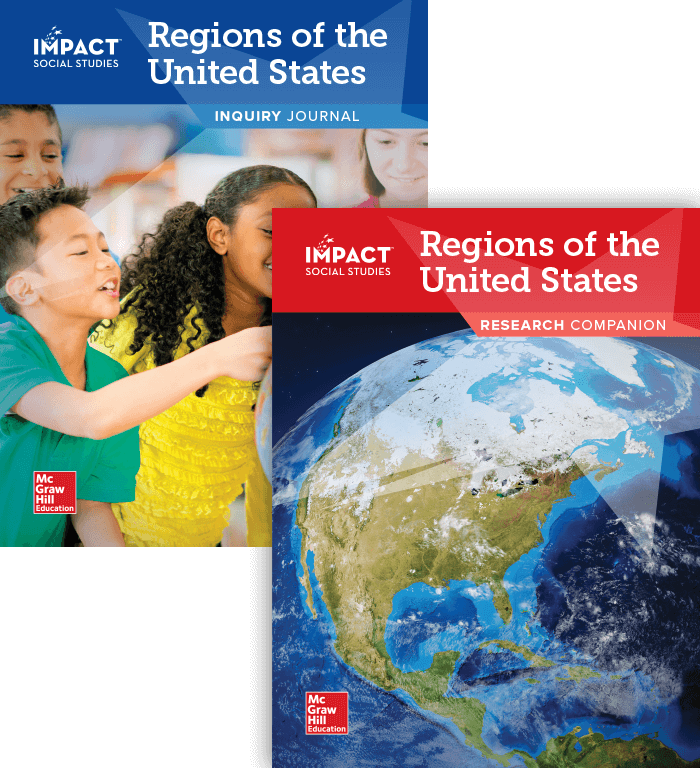



Students learn about the history, geography, government, and economics of each region. By interacting with maps, charts, timelines, and primary sources, students discover what makes each region unique, as well as what connects each region to each other and to the world.
Chapters
- How Does America Use Its Strengths and Face Its Challenges?
- Why Have People Moved to and From the Northeast?
- How Has the Southeast Changed Over Time?
- How Does the Midwest Reflect the Spirit of America?
- How Does the Southwest Reflect Its Diverse Past and Unique Environment?
- What Draws People to the West?
Grade 5
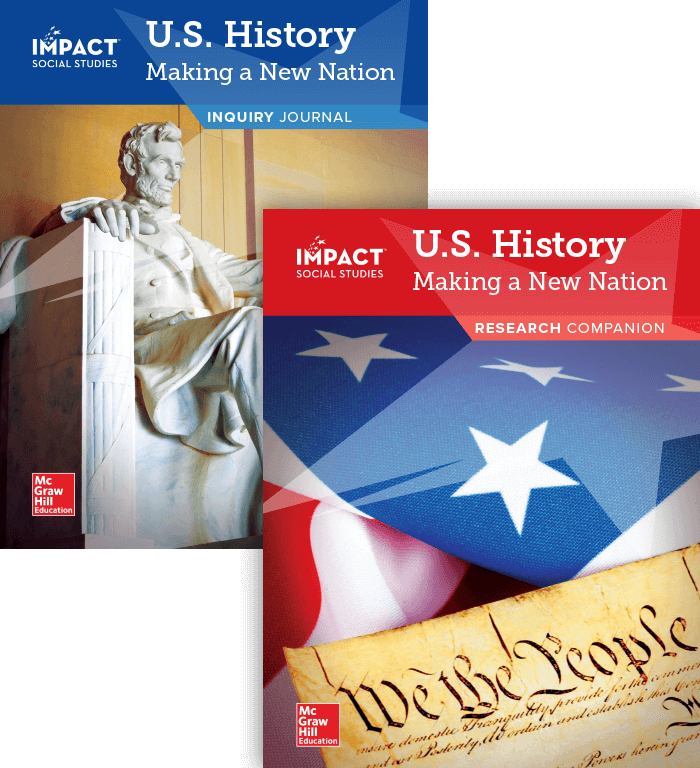



Students learn about North America before the founding of the United States as well as the first several decades of the republic. By engaging with diverse perspectives and primary sources, students build an understanding of the cooperation and conflicts that defined the early nation.
Chapters
- How Were the Lives of Native Peoples Influenced by Where They Lived?
- What Happened When Diverse Cultures Crossed Paths?
- What Is the Impact of People Settling in a New Place?
- Why Would a Nation Want to Become Independent?
- What Does the Revolutionary Era Tell Us About Our Nation Today?
- How Does the Constitution Help Us Understand What It Means to Be an American?
- What Do the Early Years of the United States Reveal About the Character of the Nation?
- What Was the Effect of the Civil War on U.S. Society?
